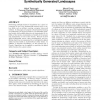1410 search results - page 274 / 282 » Mobile Robots and Intelligent Environments |
IWINAC
2005
Springer
14 years 1 months ago
2005
Springer
This paper presents a method for spatial navigation performed mainly on past experiences. The past experiences are remembered in their temporal context, i.e. as episodes of events....
HAPTICS
2002
IEEE
14 years 19 days ago
2002
IEEE
We present the results of using Hidden Markov Models (HMMs) for automatic segmentation and recognition of user motions. Previous work on recognition of user intent with man/machin...
GECCO
2006
Springer
13 years 11 months ago
2006
Springer
Two mathematical and two computational theories from the field of human and animal learning are combined to produce a more general theory of adaptive behavior. The cornerstone of ...
GECCO
2006
Springer
13 years 11 months ago
2006
Springer
Positioning multiple sensors for acquisition of a a given environment is one of the fundamental research areas in various fields, such as military scouting, computer vision and ro...
AR
2008
13 years 7 months ago
2008
Intentional behavior is a basic property of intelligence and it incorporates the cyclic operation of prediction, testing by action, sensing, perceiving, and assimilating the exper...


